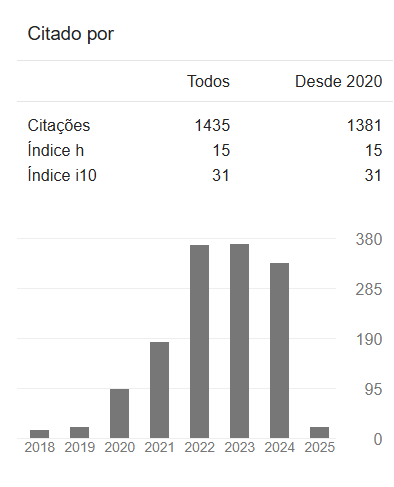ORIENTATIONS AND INSTIGATIONS PRESENT IN THE COMMON NATIONAL CURRICULAR BASE REGARDING THE USE OF DIGITAL TECHNOLOGIES IN TEACHING
DOI:
10.23926/RPD.2021.v6.n3.e079.id1248Keywords:
Digital technology, Teaching, Educational Policy, Common National Curricular Base, CompetenciesAbstract
The objective of this article is to identify the guidelines and incentives to the use of digital technologies present in the BNCC. To respond to this scenario, a documentary and bibliographic research was used to survey, collect and analyze the data in a qualitative way. In this sense, we first grounded the discussions about the BNCC and digital technologies, and also highlighted their imbrications with teaching. And finally, we scrutinized the text of the BNCC, in order to identify and list the instigations and references to the use of digital technologies that are present in this normative corpus. As a result of the research, we identified that the BNCC guides and encourages the use of digital technologies throughout basic education. This guidance is based on three basic topics: the general competencies; specific competencies by area; and, the item called digital technologies and computing. Regarding the first topic, competencies 4 and 5 stands out. In the second, we have that all curricular components are oriented towards the use of digital technologies. And in the third, the importance of the appropriation of digital technologies by the student is highlighted, not only for his school studies but also for his daily life. We conclude that the BNCC guides and encourages students and teachers to appropriate and use digital technologies, considering that they are present in all fields of human activity, and that education cannot be detached from this.
Downloads
Metrics
References
BEHAR, Patrícia A. A validação de objetos de aprendizagem para formação de professores de Educação Infantil. CINTED-UFRGS. Novas Tecnologias na Educação, Porto Alegre, v. 6, n. 1, p. 1-11, jul. 2008.
BRASIL. Constituição da República Federativa do Brasil: promulgada em 5 de outubro de 1988, 1988. Disponível em: http://www.planalto.gov.br/ccivil_03/constituicao/constituicao.htm. Acesso em: 14 maio 2020.
BRASIL. Lei nº 9.394 de 20 de dezembro de 1996. Estabelece as diretrizes e bases da educação nacional., 1996. Disponível em: http://www.planalto.gov.br/ccivil_03/leis/l9394.htm. Acesso em: 16 maio 2020.
BRASIL. MEC. Base Nacional Comum Curricular, 2018. Disponível em: http://basenacionalcomum.mec.gov.br/images/BNCC_EI_EF_110518_versaofinal_site.pdf. Acesso em: 06 fev. 2020.
COSTA, Sandra Regina Santana; DUQUEVIZ, Barbara Cristina; PEDROZA, Regina Lúcia Sucupira. Tecnologias Digitais como instrumentos mediadores da aprendizagem dos nativos digitais. Revista Quadrimestral da Associação Brasileira de Psicologia Escolar e Educacional, São Paulo-SP, v. 19, n. 3, p. 603-610, set/dez 2015. ISSN 10.1590/2175-3539/2015/0193912. Disponível em: https://www.scielo.br/pdf/pee/v19n3/2175-3539-pee-19-03-00603.pdf. Acesso em: 28 maio 2020.
ENGUITA, Mariano Fernández. Educar em tempos incertos. Tradução Fátima Murad. Porto Alegre: Artmed, 2004.
GIL, Antônio Carlos. Como elaborar projetos de pesquisa. 4. ed. São Paulo: Atlas, 2002.
KENSKI, Vani Moreira. O papel do professor na sociedade. In: CARVALHO, A. M. P. D.; CASTRO, A. D. D. Ensinar a Ensinar. São Paulo: Pioneira, 2001. p. 226.
LIBÂNEO, José Carlos; OLIVEIRA, João Ferreira de; TOSCHI, Mirza Seabra. Educação Escolar: políticas, estrutura e organização. São Paulo: Cortez, 2003.
MORIN, Edgar. Introdução ao pensamento complexo. 3. ed. Porto Alegre: Sulina, 2007.
PARADA, Eloa Azzena. TICs na escola: balanço de teses e dissertações brasileiras produzidas no período de 1990 a 2010. Dissertação (Mestrado em Educação) Programa de Pós-Graduação em Educação: Currículo, Pontifícia Universidade Católica de São Paulo/PUC-SP. São Paulo, p. 137. 2011.
REIS, Geovana; OLIVEIRA, Joao Ferreira de. PUC. A Constituição do Currículo Escolar no Brasil: Dilemas, Impasses e Perpectivas, 2018. Disponível em: https://sites.pucgoias.edu.br/pos-graduacao/mestrado-doutorado-educacao/wp-content/uploads/sites/61/2018/05/Geovana-Reis_-Joao-Ferreira-de-Oliveira.pdf. Acesso em: 16 abr. 2021.
SAVIANI, Demerval. Escola e democracia. 24. ed. São Paulo: Cortez, 1991.
SILVA, Thayse de Oliveira; SILVA, Lebiam Tamar Gomes. Os impactos sociais, cognitivos e afetivos sobre a geração de adolescentes conectados às tecnologias digitais. Rev. psicopedag., São Paulo, v. 34, n. 103, p. 87-97, 2017. Disponível em: http://pepsic.bvsalud.org/scielo.php?script=sci_arttext&pid=S0103-84862017000100009&lng=pt&nrm=iso. Acesso em: 28 maio 2020.
Downloads
Published
How to Cite
Issue
Section
License
Copyright (c) 2023 A Revista Prática Docente tem o direito de primeira publicação

This work is licensed under a Creative Commons Attribution-NonCommercial 4.0 International License.
Authors who publish in this journal agree to the following terms:
- Authors retain the copyright and grant the journal the right of first publication, with the paper simultaneously licensed under the Licença Creative Commons Attribution allows the sharing of the work with acknowledgment of authorship and initial publication in this journal.
- Authors are authorized to take additional contracts separately, for non-exclusive distribution of the version of the work published in this journal (e.g. publish in institutional repository or as a book chapter), with acknowledgment of authorship and initial publication in this journal.











